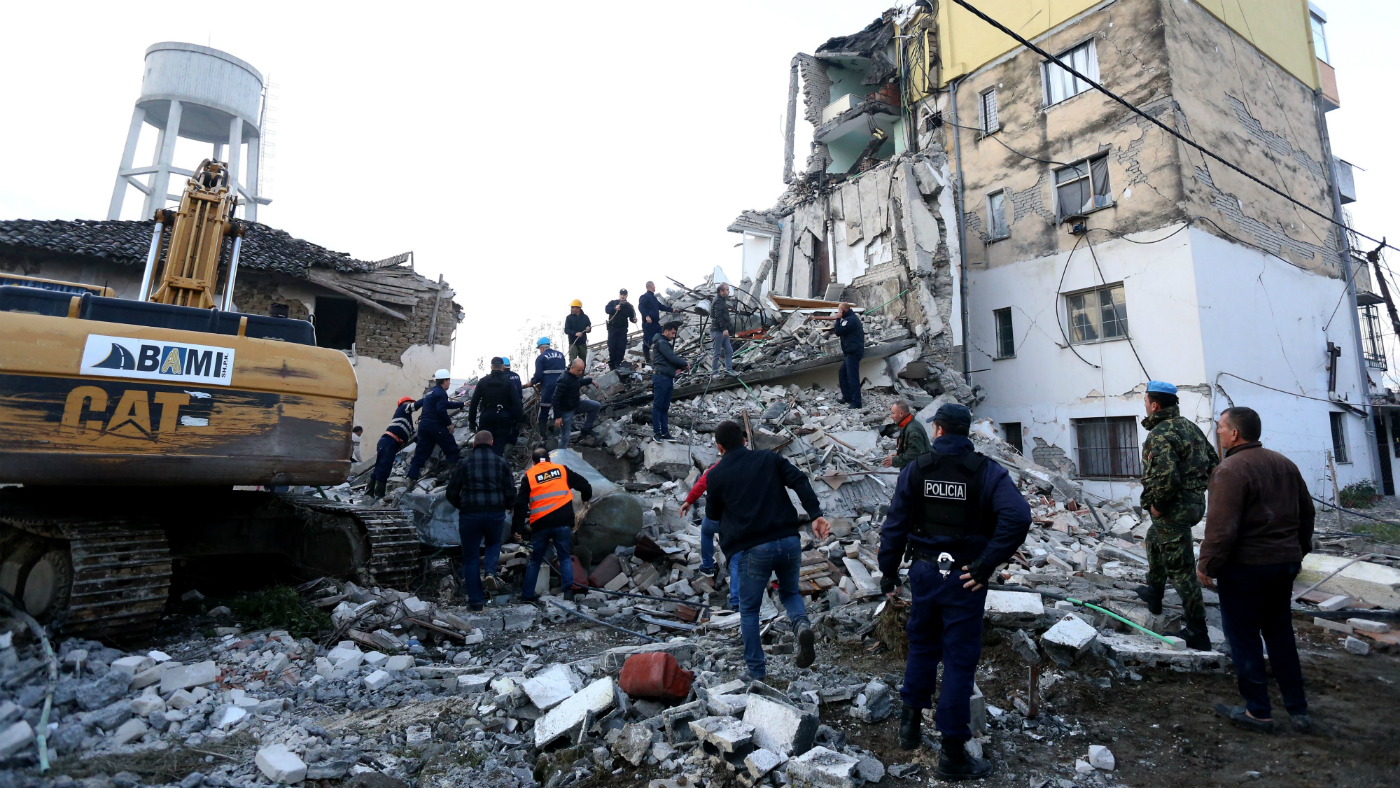Albania rocked by strongest earthquake in decades
Rescue workers continue to pull people from rubble after magnitude 6.4 quake

A free daily email with the biggest news stories of the day – and the best features from TheWeek.com
You are now subscribed
Your newsletter sign-up was successful
At least 14 people have died and hundreds have been injured after a strong earthquake struck Albania in the early hours of Tuesday morning.
The quake is the strongest felt in Albania in decades and caused the collapse of dozens of buildings in the west of the country, including in the seaside city of Durres.
Some residents are thought to still be trapped under the rubble in places, with Albanian President Ilir Meta stating that “all efforts are being done to take people out of the ruins”, reports The Guardian.
The Week
Escape your echo chamber. Get the facts behind the news, plus analysis from multiple perspectives.

Sign up for The Week's Free Newsletters
From our morning news briefing to a weekly Good News Newsletter, get the best of The Week delivered directly to your inbox.
From our morning news briefing to a weekly Good News Newsletter, get the best of The Week delivered directly to your inbox.
What happened?
The magnitude 6.4 earthquake struck shortly before 4am local time (3am GMT) on Tuesday around 19 miles west of the capital Tirana, at a shallow depth of 12.4 miles according to the United States Geological Survey (USGS).
According to authorities, three people were killed in Thumane, the 12,000-population town closest to the epicentre, while the bodies of four other victims were pulled from the wreckage of collapsed buildings in Durres.
One man is understood to have died in the town of Kurbin after jumping out of a building, Al Jazeera reports, while another confirmed victim died in an accident on a road cut off by debris in north-western Lezhe, the Guardian adds.
A free daily email with the biggest news stories of the day – and the best features from TheWeek.com
At least five more bodies are understood to have been discovered, although it is not yet known where they died.
Located along the Adriatic coast, Albania experiences regular seismic activity, suffering a 5.6 magnitude earthquake on 21 September, which damaged hundreds of homes.
This week’s earthquake is thought to have been the strongest in the country since 1979, when a magnitude 6.9 quake left 136 dead and more than 1,000 injured, says the BBC.
–––––––––––––––––––––––––––––––For a round-up of the most important stories from around the world - and a concise, refreshing and balanced take on the week’s news agenda - try The Week magazine. Start your trial subscription today –––––––––––––––––––––––––––––––
What has the response been?
Emergency services have been working to pull people from the collapsed buildings, and at least 150 people wounded during the earthquake are being treated in hospitals in Tirana and Durres, Al Jazeera says.
Albania’s Prime Minister Edi Rama said on Tuesday that neighbouring countries - including Kosovo - and the European Union had offered immediate support. The European Commission has also offered assistance.
According to the Guardian, a series of aftershocks were felt throughout the Balkans, Italy and Greece in the wake of the incident, while in nearby Bosnia a separate earthquake with a magnitude of 5.4 “struck south-east of the capital and rattled Sarajevo”. There were no immediate reports of casualties or damage.
-
 El Paso airspace closure tied to FAA-Pentagon standoff
El Paso airspace closure tied to FAA-Pentagon standoffSpeed Read The closure in the Texas border city stemmed from disagreements between the Federal Aviation Administration and Pentagon officials over drone-related tests
-
 Political cartoons for February 12
Political cartoons for February 12Cartoons Thursday's political cartoons include a Pam Bondi performance, Ghislaine Maxwell on tour, and ICE detention facilities
-
 Arcadia: Tom Stoppard’s ‘masterpiece’ makes a ‘triumphant’ return
Arcadia: Tom Stoppard’s ‘masterpiece’ makes a ‘triumphant’ returnThe Week Recommends Carrie Cracknell’s revival at the Old Vic ‘grips like a thriller’
-
 Epstein files topple law CEO, roil UK government
Epstein files topple law CEO, roil UK governmentSpeed Read Peter Mandelson, Britain’s former ambassador to the US, is caught up in the scandal
-
 Iran and US prepare to meet after skirmishes
Iran and US prepare to meet after skirmishesSpeed Read The incident comes amid heightened tensions in the Middle East
-
 Israel retrieves final hostage’s body from Gaza
Israel retrieves final hostage’s body from GazaSpeed Read The 24-year-old police officer was killed during the initial Hamas attack
-
 China’s Xi targets top general in growing purge
China’s Xi targets top general in growing purgeSpeed Read Zhang Youxia is being investigated over ‘grave violations’ of the law
-
 Panama and Canada are negotiating over a crucial copper mine
Panama and Canada are negotiating over a crucial copper mineIn the Spotlight Panama is set to make a final decision on the mine this summer
-
 Why Greenland’s natural resources are nearly impossible to mine
Why Greenland’s natural resources are nearly impossible to mineThe Explainer The country’s natural landscape makes the task extremely difficult
-
 Iran cuts internet as protests escalate
Iran cuts internet as protests escalateSpeed Reada Government buildings across the country have been set on fire
-
 US nabs ‘shadow’ tanker claimed by Russia
US nabs ‘shadow’ tanker claimed by RussiaSpeed Read The ship was one of two vessels seized by the US military